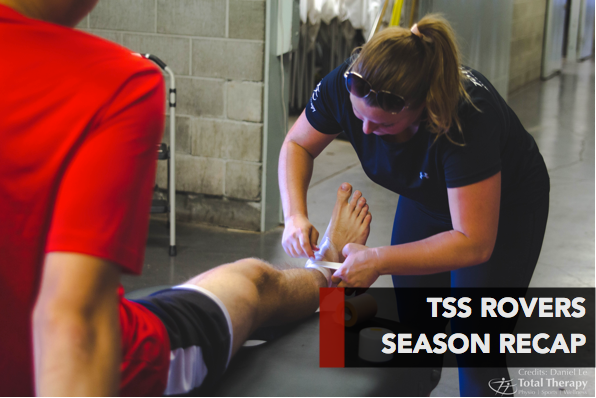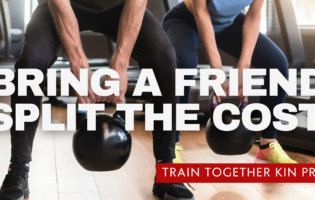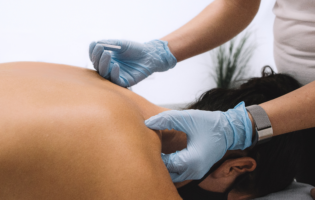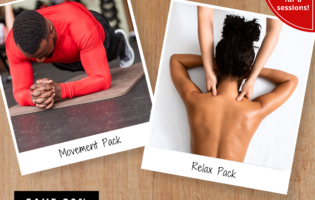Total Therapy Blog

TSS Rovers Season Recap
Total Therapy has had the pleasure of supporting the TSS FC Rovers men’s and women’s professional development soccer teams for a second year. Tonya Wheatley has been an integral part of the Total Therapy team supporting the Rovers this season and last. Here, she shares her kinesiologist’s perspective on how the team improved over the past year, suggestions for improvements, and tips for other practitioners and athletes.

Briefly describe your experience with sports medicine, athletic training, and event medical support.
I have had extensive on-field experience working as an athletic trainer with the UBC football team, medical support at the International Tennis Championships and for many small sports events, and most recently with the TSS Rovers. I enjoy working on-field because it is a fast-paced environment whenever something happens. My experience working with athletes has allowed me to develop my skills and have greater confidence both on-field and in the clinic. I have been able to work with a wide variety of injuries and have gained experience working in tandem with many different health professionals, allowing me to learn from many different skill sets.
In your eyes, how have the Rovers improved since last season?
The Rovers have improved and matured into a competitive team. They went from having many injuries leaving them short on the bench last season to having a full line of substitutions every game this season. Many of the players have also improved personally. We have had the pleasure of working with the Rovers for two years now and a handful of the players were on the team for the second time this season. It has been great to see their skills improve, but even better to see that how their team cohesion has improved, which showed on and off the field.

Tell us about some memorable highlights of the season.
One of the most memorable moments of the season was the dog breakaway during one of the home games at Swanguard Stadium. In all seriousness, every single home game was memorable with the players always playing their hearts out on the field. Beyond that, getting to know them personally and helping keep them on the field has been especially rewarding as well.
Being observant and proactive is critical for injury-prevention. What steps did the Rovers take to prevent injuries this season? What are your suggestions for improving further in future seasons?
This year in conjunction with the Rovers Strength Coach, we implemented a scoring system to rate the players’ exertion levels each day. This helped us understand when players were feeling extra fatigued in order to gauge the difficulty of practices. This was so important for the Rovers because many of the players also play on different teams, so the likelihood of burnout is much higher. In the future, I feel that it would be beneficial for the team to have dedicated gym sessions to improve performance and ensure that all players are getting the conditioning they need. Beyond this, it would be great to implement pre-season fitness testing since the players are all coming from different teams. This would give us a better impression of the players’ baseline fitness.

What are the most important skills for practitioners working with the Rovers or other high-performance teams in the future?
A variety of skill sets are important for working on field. Soft Tissue Release and Athletic Taping are two aspects of training that I use the most on-field. Beyond this, it is important to be comfortable with your skills. Things happen very quickly, and there can be pressure from players, parents and coaches to get players back in the game. Make sure to know your skills well so you can assist the player quickly and efficiently. The more confident you are in these scenarios the less people will pressure you to modify your decisions.
What are your top three tips for soccer players, of any level, for preventing injury?
- Start training early – Implement a pre-season program that involves running, strengthening, and mobility training.
- Seek a professional – By seeking assessment or a few sessions with a Kinesiologist or other professional you can identify strengths and weaknesses that you may not notice by yourself, and learn to correct any biomechanics that need improvement.
- Don’t blow off the little things – Mild injuries can become severe quickly. Seek help right away even if the injury is not preventing you from doing daily tasks. If you have pain, or if the issue is affecting you in any way, get it assessed early before it gets worse.
We are honoured to be on field with the Rovers, and look forward to supporting them again next season, improving athletes’ resilience and keeping them game-ready.
Interview by Carly Peterson
Photos by Patrick Gregorowicz & Daniel Le








Follow Us!
& Stay Up To Date
BLOG